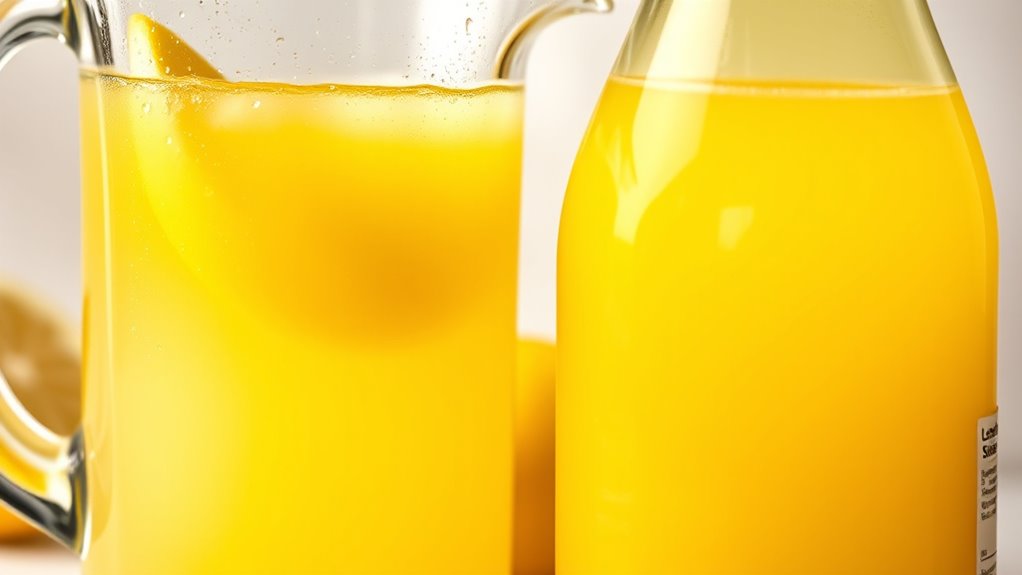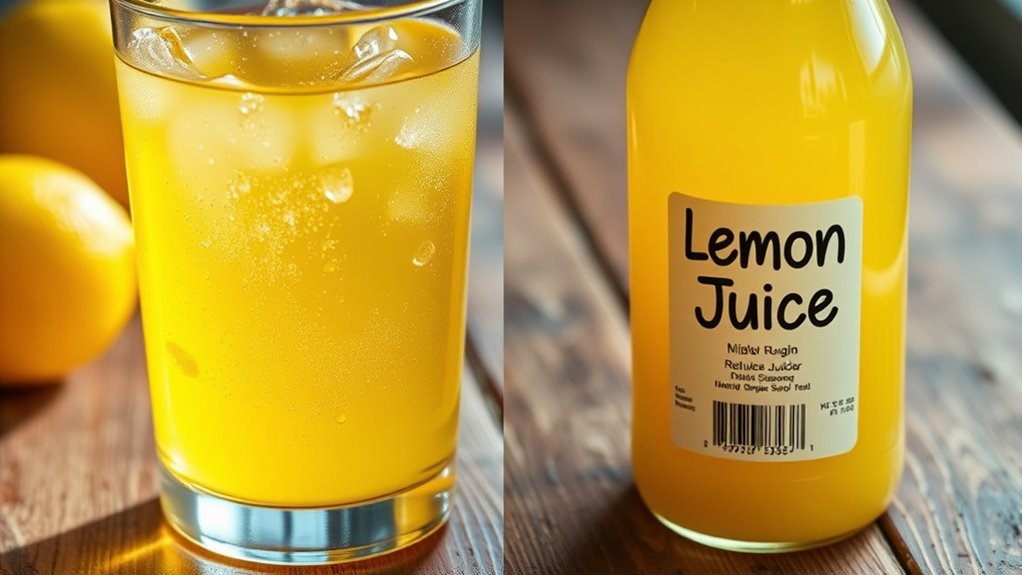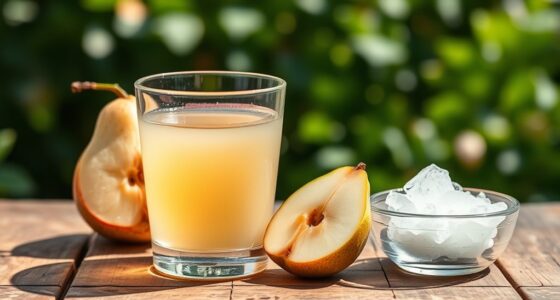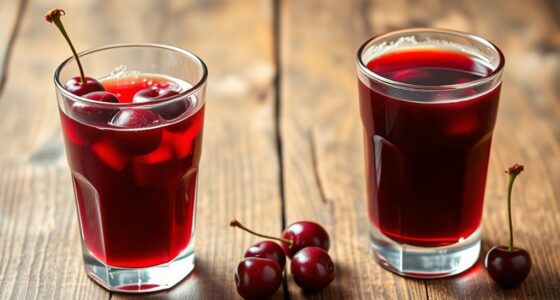Choosing fresh lemon juice over bottled offers a brighter, more vibrant flavor that truly enhances your dishes and drinks. Freshly squeezed lemon contains more antioxidants, vitamin C, and enzymes, giving you greater health benefits and a more natural taste. Bottled lemon juice is convenient but often has preservatives and added sugars that can diminish quality. Keep going to discover how to make the most of lemon zest and juice in your cooking.
Key Takeaways
- Freshly squeezed lemon juice retains more antioxidants, enzymes, and vitamin C compared to bottled versions.
- Bottled lemon juice often contains preservatives or added sugars, reducing natural health benefits.
- Fresh juice offers customizable pulp, acidity, and freshness, while bottled is more convenient.
- Squeezing lemons provides a pure, brighter flavor that enhances dishes better than processed juice.
- Fresh lemon juice supports overall health and flavor integrity, making it preferable for culinary and health purposes.

Have you ever wondered why lemon juice is a kitchen staple? It’s because lemons bring a burst of brightness to so many dishes and drinks, and their versatility makes them indispensable. But there’s more to lemons than just their juice. When you consider lemon zest, you reveal a whole new layer of flavor and aroma. Lemon zest is the finely grated outer peel that contains essential oils packed with intense citrus aroma. Adding a touch of zest can elevate baked goods, salads, and marinades, giving your dishes a fresh, vibrant punch. Plus, lemon zest isn’t just about flavor—it also packs some lemon health benefits, thanks to its high concentration of antioxidants and vitamin C.
Lemon zest is often overlooked but plays an essential role in maximizing the lemon’s potential. When you incorporate it into recipes, you’re not just adding flavor; you’re also boosting the nutritional value. The zest contains compounds that can support your immune system, thanks to the vitamin C content, and may even have anti-inflammatory properties. Because lemon zest is so concentrated, a little goes a long way, so a teaspoon can impart a strong citrus aroma and flavor without overpowering your dish. It’s a simple way to add depth to baked goods, seafood, or even beverages. Incorporating lemon zest can also enhance the effectiveness of other natural remedies, such as those found in essential oils, which share similar aromatic compounds.
Knowing the lemon health benefits can influence your choice between fresh squeeze and bottled lemon juice. Fresh lemon juice is rich in antioxidants and enzymes that aren’t as prevalent in processed versions. When you squeeze a fresh lemon, you’re getting a pure shot of vitamin C, which helps boost your immune function and protect your cells from oxidative stress. Bottled lemon juice, on the other hand, often contains preservatives or added sugars that can diminish these benefits. While it’s convenient, it’s not quite the same as fresh, especially if you’re aiming for maximum health benefits.
Choosing fresh over bottled allows you to enjoy these natural benefits fully. Plus, fresh lemon juice offers a cleaner, brighter flavor, which can make a noticeable difference in your culinary creations. When you squeeze fresh lemons, you also have control over the amount of pulp and acidity, tailoring each drink or dish to your preference. While bottled lemon juice can be handy for quick recipes, if you’re health-conscious or want the best flavor, squeezing your own lemons and incorporating lemon zest is the way to go. It’s simple, natural, and guarantees you’re getting the full spectrum of lemon’s health benefits while enhancing your dishes with fresh, invigorating flavor.
Frequently Asked Questions
How Long Does Fresh Lemon Juice Stay Fresh in the Fridge?
Fresh lemon juice typically stays fresh in your fridge for about 2 to 3 days. To maximize lemon preservation and prevent juice spoilage, store it in an airtight container and keep it cold. If you notice any off smell or discoloration, it’s best to discard it. For longer storage, consider freezing the juice in ice cube trays. Proper storage helps maintain its flavor and reduces the risk of spoilage.
Are There Additives in Bottled Lemon Juice?
Did you know that over 90% of bottled lemon juice contains additives? You might wonder about additive concerns; many brands include natural preservatives like sodium benzoate to extend shelf life. While these additives help prevent spoilage, some prefer pure lemon juice without them. Always check the label if you’re concerned about additives, and choose brands that prioritize natural ingredients to avoid unwanted preservatives.
Can Bottled Lemon Juice Substitute Fresh Lemon Juice in Recipes?
Yes, bottled lemon juice can substitute fresh lemon juice in recipes, but keep in mind that flavor preservation isn’t perfect. Bottled juice often has a milder taste and may lack the brightness of fresh lemons. Nutritional differences are minor, though fresh juice retains more vitamin C. Use bottled lemon juice when convenience matters, but for the best flavor, fresh squeezed is preferable, especially in dishes where lemon flavor shines.
Is Organic Lemon Juice Better Than Conventional?
You’ll find organic lemon juice often has more benefits, like being free from synthetic pesticides and preservatives, which can be a concern with conventional options. While conventional lemon juice might look clearer and last longer, organic varieties usually retain more natural flavor and nutrients. If you want a cleaner, more natural taste and fewer chemical worries, organic lemon juice is a better choice. It supports healthier options for your recipes and overall well-being.
How Does Storage Affect the Flavor of Lemon Juice?
Storage substantially impacts lemon juice’s flavor, as improper preservation methods lead to flavor degradation. When you store lemon juice, keep it in an airtight container in the refrigerator to slow down oxidation and preserve its bright, citrusy taste. Avoid exposing it to heat, light, or air for too long, since these factors cause the juice to lose freshness and develop off-flavors over time. Proper storage helps maintain its vibrant flavor longer.
Conclusion
So, next time you squeeze a lemon, remember that fresh juice isn’t just tastier—some say it retains more nutrients and antioxidants than bottled. While bottled lemon juice offers convenience, it often contains preservatives that might diminish its health benefits. Remarkably, some experts suggest that the acidity and flavor complexity of fresh lemon juice could actually enhance your body’s absorption of vitamin C. Ultimately, choosing fresh over bottled might just give you a slight edge in both taste and health.
Cindy thoroughly researches juicing trends, techniques, and recipes to provide readers with practical advice and inspiration. Her writing style is accessible, engaging, and designed to make complex concepts easy to understand. Cindy’s dedication to promoting the advantages of juicing shines through her work, empowering readers to make positive changes in their lives through the simple act of juicing.











